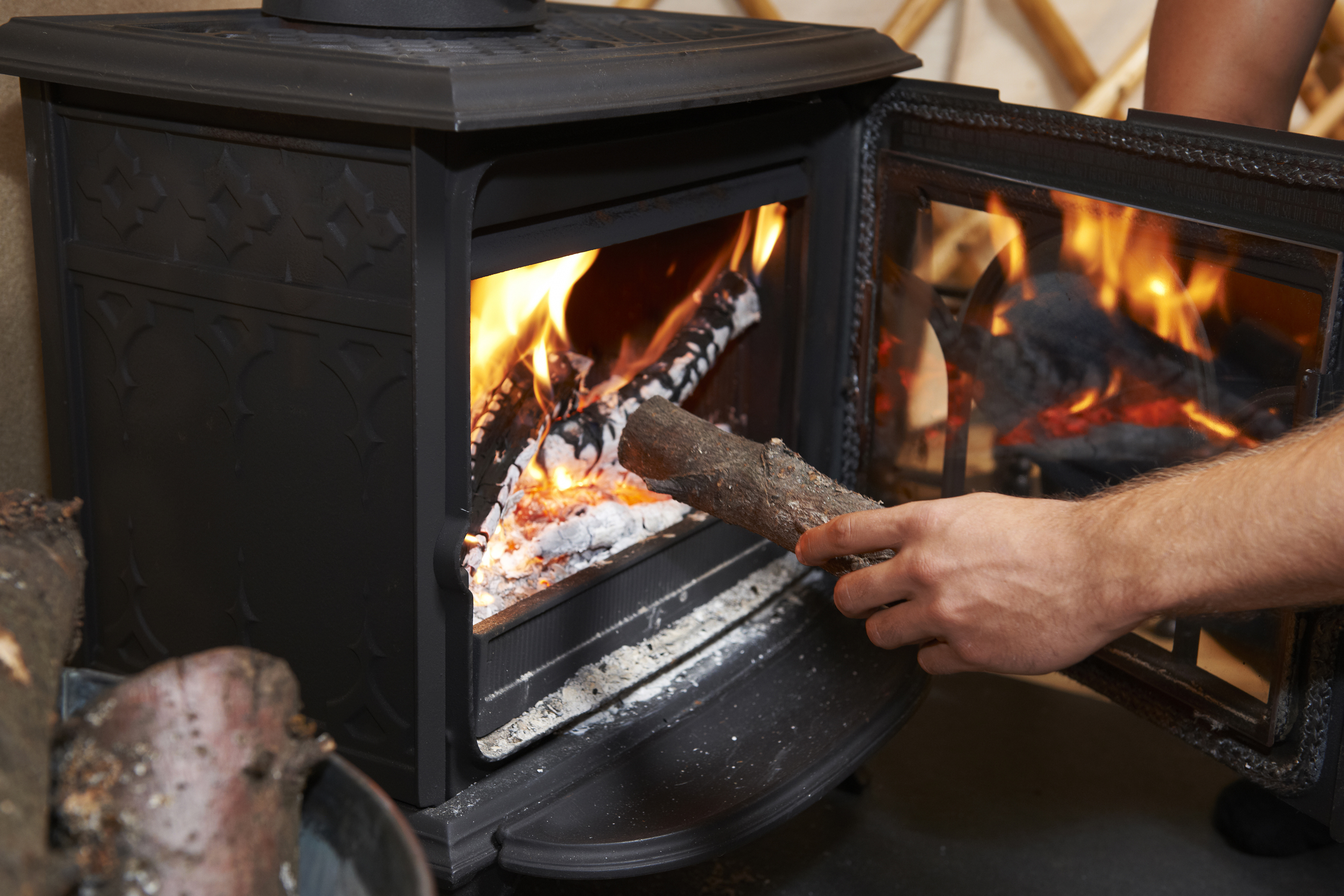Wood burning stoves vs central heating: Which is better?
Here are the pros and cons of wood burning stoves vs central heating to help you decide which is best for you

With energy costs up 27% from a year ago, many are looking for cheaper alternatives to heat their homes. One way individuals are doing this is by switching from central heating to wood burning stoves.
This switch could save you up to 10% on your heating bill. However, deciding which option is better for you ultimately depends on a number of factors. Other ways to lower your energy bills include opting for one of the best smart thermostats or using a space heater to warm specific rooms.
Here are the pros and cons of wood burning stoves vs central heating to help you decide which is best for you.
Wood burning stoves

Wood burning stoves are heating appliances designed to warm your home through the burning of wood. As the fire warms the body of the stove, this heat will radiate into the room. Since wood burning stoves don’t have air ducts to move hot air throughout your home, they are better suited for smaller, open-concept spaces, as opposed to large homes with many rooms.
Here are the benefits and drawbacks of installing a wood burning stove in your home this winter.
Pros:
- Wood is more eco-friendly than fossil fuels.
- Using a wood burning stove can help you save on energy costs.
- Wood burning stoves can still warm your home despite power outages.
- Most wood burning stoves are very efficient.
Cons:
- Installation of a wood burning stove is expensive and many homes cannot accommodate one.
- Wood burning stoves will not heat your entire house like central heating will.
- Firewood can quickly become expensive if you do not have access to free timber.
- Wood burning stoves can cause particle pollution which is potentially damaging to one’s health.
- Open fires means increased safety risks.
When installing a wood burning stove, you'll want to do it in a central area so it will heat the rooms where you spend the most time. It should also be installed on the ground floor, so hot air can rise and heat upstairs rooms, saving you money on your electric bill.
By ensuring your home is properly insulated you'll be able to prevent hot air from escaping when heating your home. You can do this by weatherproofing your windows or insulating your attic space. Additionally, by keeping your stove clean you'll increase it's efficiency.
Sign up to get the BEST of Tom's Guide direct to your inbox.
Get instant access to breaking news, the hottest reviews, great deals and helpful tips.
Central Heating

Central heating heats up an entire home from one central heating source, which is usually a gas boiler. Heat is then distributed as hot water through a network of pipes or as hot air through a series of ducts. Central heating systems are efficient and easy to maintain.
More often people are turning to smart thermostats to make it easier to control the temperature, even when they're not home. Here are the pros and cons of using central heating in your home.
Pros:
- Central heating systems usually have convenient and easy to use controls.
- Central heating provides warmth to all areas of a home.
- Many central heating systems come with built-in safety devices and gas boilers must adhere to safety standards.
- Will use heat when needed, then will automatically shut off when temperatures rise about a set level
- Gas fueled central heating is relatively inexpensive.
Cons:
- Furnaces can spread allergens and/or dust.
- Ductwork can take up a lot of space in your walls.
- Can be difficult to access if maintenance is required.
- Old systems are not as efficient.
Bottom Line
Overall, central gas heating is the cheapest way to heat your home, cheaper than a wood burning stove. It’s more convenient, easier to use and offers more safety as well. If you’re really trying to save money, these tips to save on heating costs this winter can potentially be more cost effective than switching to a wood burning stove.

Erin pairs personal experience with research and is passionate about sharing personal finance advice with others. Previously, she was a freelancer focusing on the credit card side of finance, but has branched out since then to cover other aspects of personal finance. Erin is well-versed in traditional media with reporting, interviewing and research, as well as using graphic design and video and audio storytelling to share with her readers.
-
DThunderGunB I have to disagree with the idea that a centeral heating system is more cost effective, you may think so until one needs to be repaired...but like you mentioned it depends on your situation and a ton of variables as well. Plus you did briefly mention the biggest drawback to the central system which is, no power=no heat, but there is another factor to consider as well and thats if people are crazy enough to sign up for a smart system to be installed that measures your usage, the power company can willfully lock your thermostat, and you put your comfort at their mercy. I don't know about you but I find the wood stove to me missing one of the most important positives to the wood stove. You also forgot to mention... It's a wood burning stove when the power gets wiped out, you can still cook and boil water as well as heat your living space...while I agree it won't heat every room in a larger home, it'll still keep you from freezing to death if the power is off for an extended period of time. Unfortunately I don't have a wood burning stove at the moment but if someone does one of the best places to find a wood source is to find free pallets if they can't find someone wanting trees taken down. People are always giving free pallets away, plus one great thing with pallet wood is it's already been seasoned most of the time, and though it's pallet wood which is usually pine or cedar the drawback is pine and cedar wood is soft wood and will burn quickly but will burn a lot hotter. I use pine wood to start my fires and toss on hardwood like oak or hedge apple because that burns much longer. I don't rely on either in my home I currently live in, we have a wall mounted propane heater that's vented and it heats nearly the whole house the parts that don't are the bathrooms and I keep space heaters in them to keep the pipes from freezing. The next house I get will most assuredly have a wood burning stove, for one I can control the amount of heat because nobody can lock the thermostat remotely...and without power everybody will be crashing in the living room or near the kitchen, but it'll be nice and toasty still. Other than those few critiques your article was a good read. The assumption that centeral heat is purely based on your particular home and it's size and ability to effectively hear the entire house, I was just pointing out that, it is literally a case by case basis because of the amount of variables that are completely subjectual and would undoubtedly change from person to person.Reply
